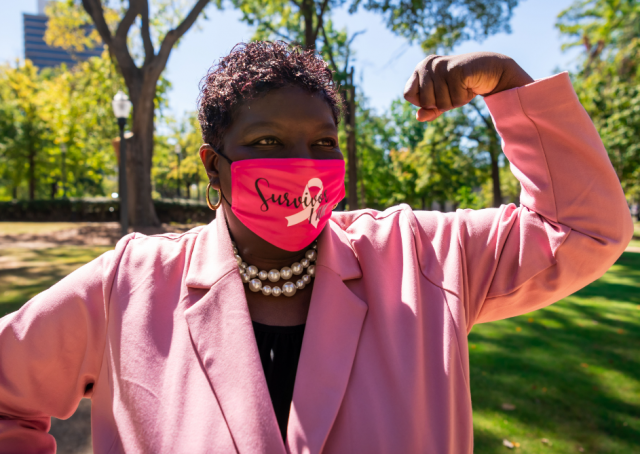
By Tehreem Khan
Alabama NewsCenter
October is Breast Cancer Awareness Month, when experts are emphasizing early detection and treatment.
Dr. Helen Krontiras is a professor in UAB’s Heersink School of Medicine’s Department of Surgery and director of the Division of Breast and Endocrine Surgery. She shares her expertise on causes and prevention tactics for breast cancer.
Causes and Treatment
Many factors influence breast cancer risk, including family history, lifestyle habits and advancing age.
“Breast cancer is the most common cancer among women in the United States after skin cancer (Centers for Disease Control and Prevention),” said Krontiras, who is director of clinical affairs for the O’Neal Cancer Service Line. “However, thanks to research advances and improved methods of early detection, most women will have an excellent prognosis when diagnosed with breast cancer.”
Treatment for breast cancer has become more personalized and precise throughout the years.
“We are trying to improve the outcomes while minimizing the toxicities of breast cancer treatment,” she said. “One of the most exciting things we have done in the last 10 to 20 years is increasing targeted therapy for different types of breast cancer and deescalating therapies.”
Prevention
“Despite excellent treatment options, we want to get to a point where we don’t have to treat cancer – where people don’t get cancer to begin with,” Krontiras said.
Use the following tips to reduce the risk of developing breast cancer:
— Eat a healthy diet and exercise regularly. Exercise does not have to be vigorous; something as simple as a brisk walk can help, too.
— Avoid alcohol. Excessive consumption of alcohol increases the risk of breast cancer.
— Quit smoking. There are many reasons to avoid smoking – one of the most important reasons is to decrease the risk of breast cancer.
Krontiras said that, thanks to research advances and improved methods of early detection, most women will have an excellent prognosis when diagnosed with breast cancer.
The most important factor in the diagnosis and treatment of breast cancer is early detection.
“We want women to have regular screenings, so that if they are going to get cancer, they can find it early, when it’s most treatable and curable,” Krontiras said.
Other Things to Know
Men may get breast cancer but the disease is not common in males, who account for about 1 percent of diagnoses.
“All people who have breasts should participate in breast self-awareness,” Krontiras said. “That means, if there are changes in the breast, you should let your doctor know. Anything such as a lump, skin changes, nipple discharge or nipple inversion can be a sign of cancer.”
“It is important to ask questions about family history because having a family history of breast cancer and some other cancers does increase the risk of breast cancer,” Krontiras said. “If you have a family history of breast cancer, especially in younger women, you may want to start screening earlier than usual. Talk to your doctor about what is right for you.”
Observing Breast Cancer Awareness Month
Particularly during Breast Cancer Awareness Month, Krontiras wants people to remember that knowledge is power.
“We want to make sure patients have all the information they need for early diagnosis and treatment,” Krontiras said
Seek reputable information from organizations like the American Cancer Society to dispel myths and learn more about breast cancer.
To assist with early detection, schedule your mammogram today at the UAB Kirklin Clinic or discuss present health conditions with a breast health specialist at the UAB O’Neal Comprehensive Cancer Center.
This story originally appeared on the UAB News website.



